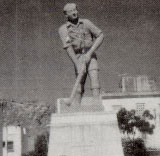My First Coach
He drove home the lesson that hockey was a team game and I had no right to keep the ball to myself. I was also taught marksmanship at the goal, not so much with powerful hits as with placements and pushes.
Autobiography of Hockey Wizard Dhyan Chand
Published by Sport & Pastime, Chennai, 1952
| Page 1 | Page 2 | Page 3 |
|
Page 4 | Page 5 | Page 6 |
My First Coach | I took a fancy to dribbling from the very start of my
hockey career. Subedar-Major Bale Tiwari, my guru, frowned on this tendency,
and would never allow me to dribble too long on hang on to the ball.
He drove home the lesson that hockey was a team game and I had no right to keep the ball to myself. I was also taught marksmanship at the goal, not so much with powerful hits as with placements and pushes. |
|||||
| Page 7 | Page 8 | Page 9 | Page 10 | Page 11 | Page 12 | |
![]() ow
I shall tell you when I first started playing hockey. It was just an accident
how it came about. When I joined the First Brahmin Regiment, we had a Subedar-Major
by the name of Bale Tiwari who was a keen hockey enthusiast and a very fine
player. He took a fancy to me.
ow
I shall tell you when I first started playing hockey. It was just an accident
how it came about. When I joined the First Brahmin Regiment, we had a Subedar-Major
by the name of Bale Tiwari who was a keen hockey enthusiast and a very fine
player. He took a fancy to me.
My regiment was well-known in hockey circles, and hockey was the only outdoor game to which the regiment devoted most of its sporting attention. Bale Tiwari initiated me into this game and gave me my first lessons. He was my guru. We had no fixed times at the Cantonment to play hockey. We indulged in it at all hours of the day.
From the very start I took a keen interest in the game. I showed promise in the various practice games, and my seniors thought that in course of time I would be a first class hockey player. I did not mix with the players of my regiment much. I kept myself aloof most of the time. That has been my temperament all my life.
I was thrilled when my Subedar-Major told me one day that I had been selected to play for our regiment in the annual military tournament in Delhi. That was the first big match that I played in. We won the tournament and our officers felt very proud of us, because in military circles this annual event was eagerly competed for. My position as the centre-forward in the regiment team was permanently assured after this tournament.
I took a fancy to dribbling from the very start of my hockey career. Subedar-Major Bale Tiwari, my guru, frowned on this tendency, and would never allow me to dribble too long on hang on to the ball. He drove home the lesson that hockey was a team game and I must pass the ball at the correct time. I had no right to keep the ball to myself, he said.
Another thing I was taught was marksmanship at the goal, not so much with powerful hits as with placements and push-strokes. These early lessons stood me in good stead, and if present-day inside-forwards who occasionally played with me thought that I was rude when I shouted for a pass, they should not have misunderstood it. My brother Roop Singh got any amount of scolding and rebukes from me when he indulged in pattern-weaving and playing to the gallery.
Throughout my career I hardly played for a civilian team or in civilian tournaments. My entire hockey, except in the Olympic Games, was confined to regimental tournaments. The Jhansi Heroes was the only civilian club, as far as I can recollect, for whom I played in one or two big civilian tournaments.
But then, the Jhansi Heroes was our home club. We founded it and nursed it. Jhansi boys always eagerly looked forward to my annual leave, as it was during my holidays in Jhansi that I played a lot of hockey for the Jhansi Heroes.
And many a youngster who came into the first flight of Indian hockey at a later stage in life learnt his hockey, I should say, from me or from the Jhansi Heroes in our private matches in and around Jhansi. Kishan Lal, Mathura Prasad, Roop Singh, Ismail, Nanhe Lal and many others played with us daily in practice matches in Jhansi.
![]()

Dhyan Chand's statue at the Jhansi Heroes ground
![]()